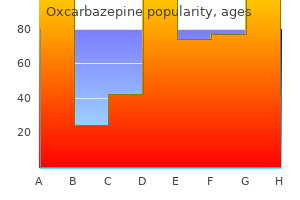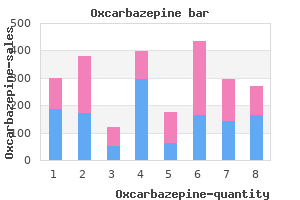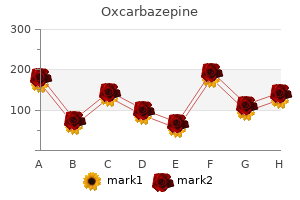

"Buy oxcarbazepine 600mg with mastercard, schedule 8 medications victoria".
T. Milten, MD
Program Director, Albert Einstein College of Medicine
Earlier detection of microalbuminuria in diabetic patients using a new urinary albumin assay symptoms 3 days dpo discount oxcarbazepine 300 mg with amex. Reactivity of urinary albumin (microalbumin) assays with fragmented or modified albumin conventional medicine order oxcarbazepine 600mg. Association between albuminuria and proteinuria in the general population: the AusDiab Study medicine hunter buy oxcarbazepine 300mg low price. The Coomassie Brilliant Blue method underestimates drug-induced tubular proteinuria medicine 377 oxcarbazepine 150 mg overnight delivery. Prognostic value of tubular proteinuria and enzymuria in nonoliguric acute tubular necrosis. Reversible tubular proteinuria precedes microalbuminuria and correlates with the metabolic status in diabetic children. Differential excretion of urinary proteins in children with vesicoureteric reflux and reflux nephropathy. The effect of age on creatinine clearance in men: a cross-sectional and longitudinal study. Association between blood pressure and the rate of decline in renal function with age. Slower decline of glomerular filtration rate in the Japanese general population: a longitudinal 10-year follow-up study. Inflammatory biomarkers and decline in kidney function in the elderly: the Cardiovascular Health Study. Assessing the progression of renal disease in clinical studies: effects of duration of follow-up and regression to the mean. The effects of dietary protein restriction and blood-pressure control on the progression of chronic renal disease. The progression of chronic kidney disease: a 10-year population-based study of the effects of gender and age. Decline in kidney function before and after nephrology referral and the effect on survival in moderate to advanced chronic kidney disease. Predictors of the progression of renal disease in the Modification of Diet in Renal Disease Study. One-year change in kidney function is associated with an increased mortality risk. Changes in albuminuria predict mortality and morbidity in patients with vascular disease. Trajectories of Kidney Function Decline in the 2 Years Before Initiation of Long-term Dialysis. Predicting the risk of end-stage renal disease in the population-based setting: a retrospective casecontrol study. A scoring system to predict renal outcome in IgA nephropathy: from a nationwide prospective study. Cardiovascular risk factors and incident acute renal failure in older adults: the cardiovascular health study. Acute renal failure in critically ill patients: a multinational, multicenter study. Acute renal failure after coronary intervention: incidence, risk factors, and relationship to mortality. A simple risk score for prediction of contrast-induced nephropathy after percutaneous coronary intervention: development and initial validation. Bedside tool for predicting the risk of postoperative dialysis in patients undergoing cardiac surgery. Influence of renal dysfunction on mortality after cardiac surgery: modifying effect of preoperative renal function. In-hospital and long-term mortality in male veterans following noncardiac surgery. Incidence and outcomes of acute kidney injury in a referred chronic kidney disease cohort.

Semistructured Interviews Because clinicians sometimes want to be sure to cover specific ground with their questions medications requiring prior authorization buy 150mg oxcarbazepine with mastercard, they may use a semistructured interview format treatment uterine cancer purchase oxcarbazepine 300mg, asking a list of standard questions but formulating their own follow-up questions medicine 223 order oxcarbazepine 600mg on-line. Further tests will be done to determine the specific memory problems symptoms upper respiratory infection buy cheap oxcarbazepine 300mg, their cause, and possible treatments. For instance, as part of the mental status exam, patients are routinely asked whether they remember their own name, the date and year, and who is president. People from other cultures may answer some of the questions in a mental status exam in unconventional ways, and clinicians must take care not to infer that "different" is "abnormal. Each module starts off with a question to assess whether the individual has symptoms related to that category of disorders. If the patient does not have such symptoms, the rest of the questions in the module are skipped. However, a thorough clinical interview can be time-consuming and may not be as reliable and valid as assessment techniques that utilize tests. Photo Edit Tests of Psychological Functioning Many different tests are available to assess different areas of psychological functioning. Some tests assess a relatively wide range of abilities and areas of functioning (such as intelligence or general personality characteristics). Other tests assess a narrow range of abilities, particular areas of functioning, or specific symptoms (such as the ability to remember new information or the tendency to avoid social gatherings). Cognitive Assessment One tool to assess cognitive functioning is an intelligence test. Current versions of intelligence tests have been designed to minimize the influence of cultural factors, in part by excluding test items that might require cultural knowledge that is unique to one group (and would thus put members of other groups at a disadvantage) (Kaufman et al. Moreover, newer tests and revisions of older tests include specific norms for different ethnic groups. Neuropsychological testing, described earlier, can also be used for cognitive assessment. Many of the tests in a typical neuropsychological battery assess basic cognitive functions, such as perception, memory, and language comprehension. Other cognitive testing focuses purely on cognitive functions, without any regard to which parts of the brain give rise to these functions. For example, memory tests can discover whether a person has significantly greater difficulty recalling events from the relatively distant past than recalling recent events. Personality Assessment Various psychological tests assess different aspects of personality functioning. Inventories In order to assess general personality functioning, a clinician may use an inventory-a questionnaire with items pertaining to many different problems and aspects of personality. An inventory can indicate to a clinician what problems and disorders might be most likely for a given person. Inventories usually contain test questions that are sorted into different scales, with each scale assessing a different facet of personality. Originally developed in the 1930s to identify people with mental illness, it was revised in 1989 to include norms of people from a wider range of racial, ethnic, and other groups and to update specific items. The respondent rates each question as being true or false about himself or herself. The validity scales assess the degree to which the respondent answers in order to appear psychologically healthier or more impaired than he or she actually is (as occurs with malingering or factitious disorder). The pattern of scores on the various scales creates a profile, as illustrated in Figure 3. Different profiles are associated with different patterns of personality functioning and impairment. What Is Assessed An inability or unwillingness to complete the test appropriately, which could indicate the presence of symptoms that interfere with concentration. Attempts to present himself or herself in a positive way, not admitting even minor shortcomings. Low scores suggest attempts to try to fake appearing to have "good" mental health or psychopathology; high scores suggest some type of psychopathology.

The strength of the recommendation and the quality of evidence are provided in parenthesis within each recommendation medicine bg purchase oxcarbazepine 600mg online. Algorithm the benefits and harm for each comparison of interventions is provided in summary tables and summarized in evidence profiles medications given before surgery order 300 mg oxcarbazepine with visa. The estimated balance between potential benefits and harm was considered when formulating the recommendations medicine rash oxcarbazepine 600 mg visa. Many recommendations are ungraded which indicates a greater need to help each patient arrive at a management decision consistent with her or his values and preferences symptoms right after conception discount oxcarbazepine 150mg without a prescription. Implementation considerations these recommendations are global and the Work Group acknowledges the importance of local application. Review criteria were not suggested because implementation with prioritization and development of review criteria must proceed locally. Furthermore, most recommendations are discretionary, requiring substantial discussion among stakeholders before they can be considered for adoptions as review criteria. However, important studies known to domain experts that were missed by the electronic literature searches were added to the retrieved articles and reviewed by the Work Group. Summary of the Review Process Each chapter contains one or more specific recommendations. Within each recommendation, the strength of recommendation is indicated as level 1 or level 2 and the quality of the supporting evidence is shown as A, B, C or D. The recommendation statements and grades are followed by the rationale and clarification of the wording of the statement, a brief background with relevant definitions of terms, and then a chain of logic which summarizes the key points of the evidence base and the judgments supporting the recommendation. Some sections also contain research recommendations in variable degrees of detail, suggesting future research to resolve current uncertainties. Limitations of Approach Several tools and checklists have been developed to assess the quality of the methodological process for systematic review and guideline development. Appendix 1: Concurrence with Institute of Medicine standards for systematic reviews and for guidelines. Supplementary material is linked to the online version of the paper at. She has over 210 peer-reviewed publications, numerous book chapters, and is co-editor of a textbook Chronic Kidney Disease: A Practical Guide to Understanding and Management. Dr Stevens has authored over 90 publications in peerreviewed journals and textbooks, and has given over 100 presentations and 65 guest lectures in national and international society meetings. From 1985-1987 he was Juvenile Diabetes Research Foundation fellow at the University of Minnesota working for Drs Mike Steffes and Mike Mauer. He is also presently the Director of the George W Comstock Center for Public Health Research and Prevention, and the Cardiovascular Epidemiology Program and Training Grant at Johns Hopkins Bloomberg School of Public Health. Dr Coresh has authored close to 300 publications and has mentored over 60 students. He completed his medical residency and nephrology fellowship at Hospital Puerta de Hierro in Madrid, and received his Doctor of Medicine degree from University of Cantabria (Spain). Prof de Francisco has authored or coauthored over 150 publications, including original peerreviewed articles and book chapters. His primary focus has been on improving outcomes in patients receiving hemodialysis, and on issues surrounding organ transplantation and the impact of treatment guidelines on clinical practice. This prospective longitudinal study demonstrated the impact of albuminuria, even in the ranges of microalbuminuria and below, in predicting future cardiovascular and renal events. Dr Griffith has also been involved in the education of general practitioners and practice nurses, and most recently she has lectured extensively on various topics such as atrial fibrillation, heart failure, coronary heart 129 biographic and disclosure information disease, hypertension, and stroke. She is a clinician scientist with clinical training in nephrology as well as a PhD in Epidemiology and Biostatistics. Dr Hemmelgarn holds provincial and national salary awards and operating grants, and is the recipient of the Roy and Vi Baay Chair in Kidney Research.


For additional discussion about methods for ascertainment of urine albumin versus total protein treatment centers for alcoholism cheap 300mg oxcarbazepine with visa, see Recommendation 1 medicine woman cast order oxcarbazepine 600mg on line. The implications of highlighting the importance of albuminuria for general practitioners in evaluation and prognostication may help with identification and care planning medicine lodge treaty discount oxcarbazepine 150 mg without prescription. Nonetheless medicine - cheap oxcarbazepine 150 mg, a number of concerns about the definition remain, which are clarified below. Both findings may be associated with a pathologic process, even in the absence of other markers of kidney damage. Albuminuria can be associated with obesity and metabolic syndrome, and can remit during weight loss. The mechanism of albuminuria in these conditions is not known but renal biopsies may reveal prominent vascular lesions. Patients with obesity and metabolic syndrome are at increased risk for development of diabetes and hypertension. The risk of persistent albuminuria in this condition has not been carefully studied. Albuminuria may rarely be observed in the upright but not recumbent posture in patients with the syndrome of postural proteinuria. K a urinary total protein or albumin excretion rate above the normal value for age may be substituted for albuminuria Z30 mg/24 hours. K all electrolyte abnormalities are to be defined in light of age normative values. For neonates and infants this includes Waters53 and for post-neonate to young adults, more comprehensive values can be found in Langlois. It can be used to inform the need for specialist referral, general medical management, and indications for investigation and therapeutic interventions. With inclusion of cause of kidney disease in the classification, we considered that it was no longer necessary to retain the use of the letter ``T' to refer to kidney transplant recipients. Albuminuria is included as an additional expression of severity of disease not only because it is a marker of the severity of injury but also because albuminuria itself strongly associates with progression of kidney disease. Numerous studies have identified the adverse prognostic implication of albuminuria irrespective of level of kidney function. While these data are sparse in relation to overall adult numbers, this represents one of the largest pediatric nephrology trials. The distinction between systemic diseases affecting the kidney and primary kidney diseases is based on the origin and locus of the disease process. In primary kidney disease the process arises and is confined to the kidney whereas in systemic diseases the kidney is only one victim of a specific process, for example diabetes mellitus. The location of pathologic-anatomic findings is based on the magnitude of proteinuria, findings from the urine sediment examination, imaging, and renal pathology. This method of separating systemic diseases and primary kidney diseases is only one, proposed by the Work Group, to aid in the conceptual approach. Table 4 represents an example of a classification of causes of kidney diseases based on these two domains. Specialized diagnostic testing, such as kidney biopsy or invasive imaging studies are performed only when it is essential to confirm some diagnoses and the benefits justify the risks and cost. This current classification further acknowledges the importance of dividing Stage 3 based on data supporting different outcomes and risk profiles into categories G3a and G3b (Figure 5). As such, specific categorization of G1-5 as suggested in this Recommendation would seem not be of value, and might be misleading if applied to a child less than 2 years of age. Reprinted with permission from Massachusetts Medical Society; accessed. More 28 the purpose of this statement is to ensure communication and to reflect that albuminuria category is an important predictor of outcomes. The association of high levels of proteinuria with signs and symptoms of nephrotic syndrome is well known. The detection and evaluation of lesser quantities of proteinuria have gained additional significance as multiple studies have demonstrated its diagnostic, pathogenic, and prognostic importance.